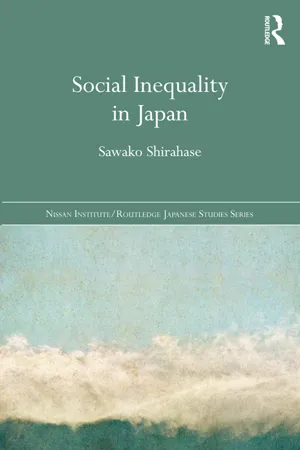
Social Inequality in Japan
Sawako Shirahase
- 244 pages
- English
- ePUB (adapté aux mobiles)
- Disponible sur iOS et Android
Social Inequality in Japan
Sawako Shirahase
À propos de ce livre
Japan was the first Asian country to become a mature industrial society, and throughout the 1970s and the 1980s, was viewed as an 'all-middle-class society'. However since the 1990s there have been growing doubts as to the real degree of social equality in Japan, particularly in the context of dramatic demographic shifts as the population ages whilst fertility levels continue to fall.
This book compares Japan with America, Britain, Italy, France, Germany, Sweden and Taiwan in order to determine whether inequality really is a social problem in Japan. With a focus on impact demographic shifts, Sawako Shirahase examines female labour market participation, income inequality among households with children, the state of the family, generational change, single person households and income distribution among the aged, and asks whether increasing inequality and is uniquely Japanese, or if it is a social problem common across all of the societies included in this study. Crucially, this book shows that Japan is distinctive not in terms of the degree of inequality in the society, but rather, in how acutely inequality is perceived. Further, the data shows that Japan differs from the other countries examined in terms of the gender gap in both the labour market and the family, and in inequality among single-person households – single men and women, including lifelong bachelors and spinsters – and also among single parent households, who pay a heavy price for having deviated from the expected pattern of life in Japan.
Drawing on extensive empirical data, this book will be of great interest to students and scholars interested in Japanese culture and society, Japanese studies and social policy more generally.
Foire aux questions
Informations
Table des matières
- Cover
- Half Title
- Title Page
- Copyright Page
- Table of Contents
- List of figures
- List of tables
- Preface
- Acknowledgements
- Introduction: Japan compared
- 1 Japan: how much inequality?
- 2 Female labor force participation and economic inequality
- 3 Economic inequality among families with children
- 4 Youngsters who won’t leave the nest
- 5 Mothers going out to work: perceptions, attitudes, and their institutional background
- 6 Where do old people live? Ageing and household structure
- 7 Old people living alone and those in three-generation households
- Conclusion: life course and inequality
- Appendix: data in the book
- References
- Index